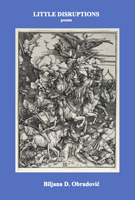Biljana D. Obradović

Biography
Biljana D. Obradović, a Serbian-American poet/translator and professor of English at Xavier University of Louisiana, has published four collections of poems, most recently Little Disruptions, and seven translations of poetry collections, including Dubravka Djurić’s The Politics of Hope (After the War). As editor/translator, she published two poetry anthologies, including Cat Painters: An Anthology of Contemporary Serbian Poetry, edited Philip Dacey’s Heavenly Muse: Essays on Poetry, and edited/translated the 2021 spring/summer edition of Atlanta Review that was devoted to Serbian poetry.
Schedule
2:00 pm to 3:00 pm
State Library, Fifth Floor, Capitol View Room
The Louisiana Poet Laureate Presents Louisiana Poets, Part 2
with Jack B. Bedell, Randy Gonzales, Biljana Obradović, Karisma Price, Dave Smith, and Louisiana Poet Laureate Alison Pelegrin
3:15 pm to 4:00 pm
Cavalier House Books Tent
Book Signing

Little Disruptions: Poems
The disruptions of these poems are hardly little: they challenge our perceptions of history, culture, and place, in the poet's careful, textured depictions.
From World Literature Today's July 2023 Book Reviews:
The front cover of Serbian American poet Biljana D. Obradović’s latest collection features Albrecht Dürer’s 1498 engraving The Four Horsemen of the Apocalypse, and the poems are sorted into four sections: “Evil Omens,” “How I Learned English Fast,” “If Only Life Were This Much Fun,” and “Places I’ve Known.” Between accounts of cancer, war, and loss, there are bright moments of music and art and encounters with well-known writers and musicians, but the darker elements intrude and disrupt repeatedly.
One of those elements is breast cancer, which surfaces in American public life every October in the form of pink shoes and gloves on professional athletes and a ubiquitous ribbon logo. Little Disruptions interrupts that sanitized dream, openly displaying the disease’s difficulties from the start in poems like “Tumors” and “Elegy for an Eastern Fallen Star.” Obradović’s mother’s cancer intrudes abruptly, with its blood and pus and morphine on full display, unhidden and unsanitized, and her death is mentioned frequently throughout the book.
Several poems address the tragedy head-on—including “The Postponed January Appointment,” “Mother’s Truss,” and “I’ve Been Here Before”—and many others mention it while describing other events, which are described by their temporal distance from the loss. The 1999 NATO bombing of Serbia looms nearly as large in the collection, most notably in “Evil Omens: On the Four Nines’ Day” and “Correspondences: During the Bombing of Serbia, Spring 1999,” and it is shown in a harsh light, not as a distant, politically justified military action but as a personal tragedy in which “The West / supports the terrorists,” a viewpoint that may cause some American readers to feel political discomfort.
As for the poet, she declares, “I am not Yugoslavian anymore. / I don’t know who I am anymore.” The collection conveys the uncomfortable, in-between position of a bilingual immigrant writer for whom cancer, NATO, Serbia, Kosovo, Bosnia, Croatia, and many other words do not have the same meaning as they do for most Americans.
Angus Woodward
Franciscan Missionaries of Our Lady University
Volunteer
Book-loving volunteers are essential to the Louisiana Book Festival's success. Whether it's escorting authors, guiding visitors, selling refreshments, working with children in the Young Readers Pavilion or other fun and rewarding assignments, the Louisiana Book Festival wants you to join the volunteer team.


